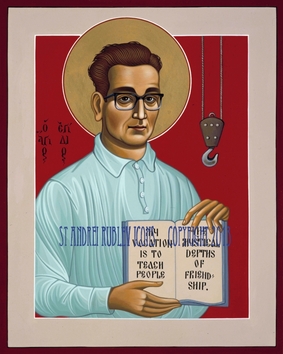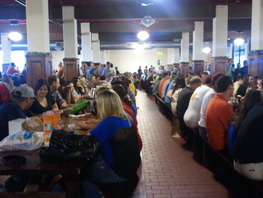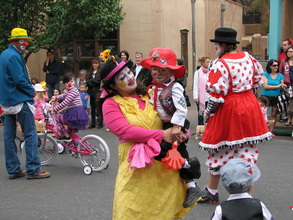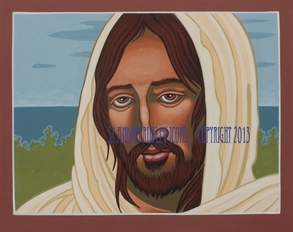 I have a few friends who are dedicated to a nonprofit organization called St. Baldrick’s Foundation* which is dedicated to research for the cure of childhood cancers. It is a volunteer driven foundation, so everything that is done to help raise money is done by people who have either been touched by childhood cancer in their own families, or are friends of those who have had that experience. Helping in funding research against cancer is indeed an act of friendship, since those involved are trying to work toward ending the suffering of children, and above all else, they stand in solidarity with them. They let those who are suffering know they are with them. That kind of compassion is the truest love of friendship. Recently I came across the story of a fascinating, yet little known man, Servant of God Egide Van Broeckhoven, SJ, who regarded friendship as his vocation. He was born in Belgium in 1933. His mother died a few days after he was born and so he was raised by foster parents. He entered the Jesuits in 1950 and was ordained a priest in 1964. From 1965 to his death in 1967 he was “the worker priest” in Brussels, devoting his life to working in factories so he could be close to the men who worked there. He died in an industrial accident at the age of 34, but by the time of his death he had already touched the lives of many through the gift of friendship which he said was his true vocation. Fr. Egide was a mystic, having received the gift of mystical prayer as a young man. Through his relationship with Christ he understood that his vocation was to teach people about the mystical depths of friendship, and therefore he desired to work in the factories to be near the poor and to become friends with everyone he could. He left behind a spiritual diary in which it is clear that he felt an intense call to bring Christ to others by bringing love through friendship, rather than preaching. In one entry in his spiritual diary Egide wrote: "Love one another as I have loved you" - Jesus looked at him with love." [John 13:33, Mk 10:21] This look of love must be clear, pure, and must express at the same time all the warmth of friendship....Every time one encounters another person in this way, he should still be able to say to God: "Let my eyes see You, For You are their light, It is only for You that I want to use them." In this look one must reveal to his friend all the breadth and depth of his own desire to encounter God: nothing else, then, than the deepest level of his own inner life."  Egide understood that all friendship flows from relationship with Jesus. He believed that in loving another as a friend, we are seeing Jesus within that person, and receiving from Jesus in return through them. This implies a radical turn toward God on our part: when encountering love in our friend we learn to recognize that it is God within them whom we are encountering, no matter who that person may be. This seems almost shocking because it implies that we must open ourselves to seeing the other as being filled with the presence of God no matter who that other person may be. But this is exactly what the Gospels teach us. Multiple times Jesus told us how we should love. He said we are to love our neighbors as ourselves; we are to love our enemies; and we are to love one another "as I have loved you." He makes it very clear that we are to love everyone as neighbor. This is most challenging: we cannot like everyone, so how on earth can we love them? Not all of us are likeable all the time....yet God never stops loving us. You might say that it is because He is God, or because He is perfect, that He can do this. That is precisely my point. Jesus knows that this is difficult for us, given that all of us are imperfect. But if we grow in friendship with Him and let His love transform us, we can be better and better at friendship. The problem is that we confuse ‘love’ with ‘like.’ That is why we struggle with loving our enemies, and sometimes with loving the friends we already have! We are not meant to like everyone; that is simply not possible given the complex nature of each person. We are not meant to approve of everything done by other people. But what we are meant to do is give respect to all persons, and we are meant to respond to them with love. That means we do not judge them as less than we are; we do not say hateful, hurtful things. Rather, we attempt to do what Jesus might do: we have compassion, mercy, and forgiveness. We live by gospel values, which mean doing the right thing. Loving does not always feel good. It can mean doing that which is difficult. But we do what we do with the motivation of love, not of control. And if we make a mistake, we look for the same forgiveness as we would offer the other.  The gospel at Monday’s Mass reflects what friendship is about. It is from Matthew 25, and is one of the greatest challenges in the gospel. If we are to be a friend, we need to be able to offer love to everyone, not just to those like ourselves. In this passage, Jesus says that every time we give food or drink to the hungry and thirsty, clothes to the naked, visit the sick, imprisoned, or lonely, and welcome the stranger we are doing this for Him. Similarly, when we neglect to do these things, we neglect Him. This is exactly what Egide was writing about: to be truly friend to others is to listen to them and discover what it is they need, and then to act on it as we are able. It is to attend to the needs of Christ by attending to the needs of His body. It is to love Him, as we reach out to Him in maybe His most distressing disguise, (as Blessed Teresa of Calcutta once said of the poor.) If we can act with love toward those in need, how much more loving will we be to those whom we are close to as our chosen friends! How much more will we see them as infinite blessings of God's love to us! And how much more will we know that when we are the ones in need of clothing, visiting, welcoming, and feeding that the response of our friends is the response of our loving God! Egide definitely understood the Gospel, and he definitely challenges us to come to greater friendship with God through our Lenten practices. In giving alms, we might think about the poor in our midst. It could be in giving to the beggar at the roadside, but it could be by giving to the local food pantry, or by helping a friend in financial need. It could be in sharing clothing by donating something good or unused from our closets, or even in purchasing underwear and socks and donating them to homeless shelter. It could be in visiting someone incarcerated, or someone physically imprisoned through special need, illness, or age. It could be in welcoming someone new to your neighborhood or church, or approaching someone who seems to be standing or sitting alone at an event.  When we open ourselves in prayer to the presence of God who is Love, we will move outward both toward God and toward others. Any encounter we have with the Living God, especially through the Sacraments and through Scripture, will transform us. Just as Moses' face began to radiate the love of God by being in His direct presence, so we, too, will radiate God's love by loving others. Love has a glow to it, which is why artists depict saints with a halo. It is not merely a symbolism; it is the reality of the light of love being radiated from the holy one. We, too, can radiate love, but we have to spend time with Love in order to let Love permeate our hearts so we can share it with those around us. While we cannot like everyone, we can love them. And in the action of choosing to love, our hearts can and will be moved from indifference and even distaste, to deep love since in recognizing Christ's love and mercy in the other, we may come to see it being directed back to us as well. Let us ask for the grace to see all people as Fr. Egide saw them, through the eyes of Jesus. May we come before God this Lent asking for the gift of radical friendship! May we ask for the intercession of Servant of God, Egide Van Broeckhoven that we may see Christ in everyone, and therefore see them as friends! May we be given the gift of Love anew during this Lent that we may share it freely! Let us continue to meet in the heart of our Friend Jesus, the Lord of Love! Peace! ©Michele L. Catanese *As far as I know, there was no such person as St. Baldrick. St. Baldrick's Foundation raises money when people voluntarily shave their heads, (hence a play on the word 'bald') and then give the money which they have raised from friends to the Foundation for cancer research. The people who get their heads shaved do it in solidarity with those who have lost their hair because of the treatments they receive for their cancer. Go to http://www.stbaldricks.org/ for more information. (A shout out to Karen for inspiring this entry! Thanks!) The icon is of The Servant of God Father Egide Van Broeckhoeven by Fr. William Hart McNichols. It can be found at http://www.fatherbill.org/all-categories/product/315-the-servant-of-god-father-egide-von-broeckhoven The image is of Jesus The Galilean also by Fr. McNichols. It can be found at http://www.fatherbill.org/all-categories/product/293-jesus-the-galilean The photos in the middle of the entry are mine.
elise
3/10/2014 02:36:36 pm
This was very interesting....and challenging to love disliked people Comments are closed.
|
Heart Speaks to Heart
|

 RSS Feed
RSS Feed

